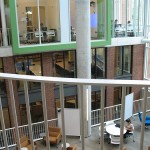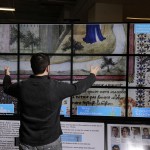 This year as usual, just before the end of winter, Baltimore hosted the WebWise Conference.
This year as usual, just before the end of winter, Baltimore hosted the WebWise Conference.
Held under the aegis of the Institute of Museum and Library Services (IMLS) and also sponsored by the Roy Rozenzweig Center for History and New Media, the event is a yearly gathering of professionals from libraries, archives, museums, system sciences, and various universities and cultural institutions. It comprises three days of lectures, workshops, sessions, and networking. Attendees learn about recent research in digital technology and reflect on its impact on library and museum services.
IMLS Grant recipients come to showcase their projects. This year the conference adopted a mostly interactive and participatory format, with many pre-conference sessions and workshops by small groups.
The keynote speaker this year was Audrey Watters, who writes the Hack Education blog. During her talk, Whose Learning is It, Anyway?, with a nod to the improv show Whose Line is It, Anyway?, Watters reflected on the links between improvisation and use of technology in education, research on artificial intelligence, and the growing MOOC initiatives.
Among the many workshops and project sessions, there was a presentation on Makerspaces. Inspired by Hackerspaces, Makerspaces are learning environments sometimes found in libraries and museums providing networks, learning labs, training and support communities, and hardware and software tools.
All of this made me think about ways JHU is engaged in the “webwise” world. For example, Hopkins’ own Digital Media Center helps students with media, art, and technology-oriented projects, the likes of which were discussed at the conference. Similarly, the Libraries’ Center for Educational Resources (CER) offers many programs for faculty, including a technology fellowship grants program. Faculty and teaching assistants can turn to the CER for consulting in technology and pedagogy.
The Sherid an libraries recently added the Brody Learning Commons (BLC) as an additional venue for educational activities. Apart from its lounges and reading rooms, the BLC offers “smart rooms” for group study, teaching, and seminars.
an libraries recently added the Brody Learning Commons (BLC) as an additional venue for educational activities. Apart from its lounges and reading rooms, the BLC offers “smart rooms” for group study, teaching, and seminars.
Have you tried its Balaur? No, not the mythological beast from Romanian legend, but an interactive visualization wall: the result of a collaboration between the Libraries and JHU’s Computer Scienc e department. It’s heartening to know that the kind of innovation showcased at WebWise is happening right here!
e department. It’s heartening to know that the kind of innovation showcased at WebWise is happening right here!
Another highlight was the Digital Preservation workshop with Robert Horton, currently from IMLS and formerly the State Archivist for the State of Minnesota, exploring the costs and benefits of digital preservation, along with pertinent legal and policy considerations and the possibilities of collaboration between institutions. He mentioned the Digital Preservation Outreach & Education program of the Library of Congress and also touched upon the UELMA, a law that addresses concerns posed by the publication of state primary legal material online. There are still many challenges in data curation, migration, and ingestion. This is a subject the Sheridan Libraries are addressing in their own Digital Research and Curation Center. Along with Data Conservancy, they also work in partnership with Data Management projects.
A notable feature this year was the Project Partnership Incubator session, which consisted of a discussion about project ideas for one’s institution and of the development of a plan with a facilitator and a small group gathered around a table. I mentioned, as an example, our Schaechter collection, a large portion of which needs to be digitized.
There were many more sessions and project presentations, too many to attend or to mention in this blog post. I wrote in more detail in The Sheridan Libraries Travels blog, if you’re interested. Webwise was once again an occasion to exchange ideas and to enjoy meeting colleagues working in this emerging field.
